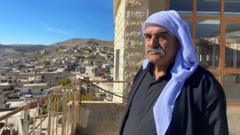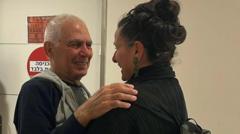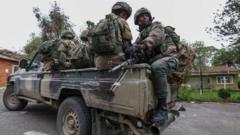This article explores the sentiments of Syrian villagers affected by the recent influx of Israeli forces and the ongoing search for stability in a tumultuous region.
'In Search of Peace: Syrian Perspectives Amidst Israeli Military Presence'

'In Search of Peace: Syrian Perspectives Amidst Israeli Military Presence'
Residents of Hadar express a desire for peace as Israel intensifies military actions in Syria.
As we approach the quiet Syrian village of Hadar, its residents reveal a paradox of hope and despair amid Israel's military incursions. Just an hour's drive from Damascus, Hadar stands at the forefront of a geopolitical struggle that has seen Israel expand its presence in the region, particularly in the wake of President Bashar al-Assad's regime collapse.
Riyad Zaidan, a local villager, encapsulated the communal sentiment when he stated, "We just need peace." His words resonate in a community that has lived through war and witnessed the transitory nature of freedom against a backdrop of foreign military operations. Israel's latest actions include the occupation of a UN-mandated buffer zone established during a ceasefire agreement from fifty years ago.
The village chief, Jawdat al-Tawil, stood amidst idyllic terraces offering views of the Golan Heights, emphasizing the enduring impact of Israel's presence since the Six-Day War of 1967. Many villagers have relatives across the border, deeply entwining the fate of Hadar with that of the occupied territories.
"We've had enough war, enough blood, enough hard life," Zaidan continued, echoing a collective desire for normalcy. However, the newfound governmental vacuum in Syria has led to a fervent Israeli military campaign, targeting remnants of the Assad regime and various militia groups in the area.
Adding to the complexity are the Druze, a minority community with historical ties to the land. Many Druze in the Golan Heights sought Israeli citizenship during the occupation; thus, in the face of increasing military pressure from groups like Hezbollah and the Iran-backed militias, local perspectives are shifting towards unwitting toleration of Israel.
As Israel expands its settlements in the Golan, fears of territorial grabs and instability loom larger. Interim Syrian leaders have expressed a desire to avoid conflict but also warned of potential escalation sparked by Israeli maneuvers.
The residents of Hadar remain cautiously vigilant, aware of the shifting alliances as they navigate their fragile reality. While some villagers had once fought against those who now hold power, their loyalties are adapting, fostering discussions aimed at achieving stability.
Amid the chaos, Jawdat al-Tawil reflects on the transformative times: "They were gangs. Now they have got rid of the tyrant [Assad], and have come to power," he observed. Yet uncertainty hangs in the air as the community contemplates the motivations of the new ruling factions.
In a landscape scarred by violence, the longing for peace serves as the unifying thread for the residents of Hadar. From their perspective, the pressing need for reconciliation and stability is critical, rendering their voices essential in understanding the ongoing narrative of a complex region.
Riyad Zaidan, a local villager, encapsulated the communal sentiment when he stated, "We just need peace." His words resonate in a community that has lived through war and witnessed the transitory nature of freedom against a backdrop of foreign military operations. Israel's latest actions include the occupation of a UN-mandated buffer zone established during a ceasefire agreement from fifty years ago.
The village chief, Jawdat al-Tawil, stood amidst idyllic terraces offering views of the Golan Heights, emphasizing the enduring impact of Israel's presence since the Six-Day War of 1967. Many villagers have relatives across the border, deeply entwining the fate of Hadar with that of the occupied territories.
"We've had enough war, enough blood, enough hard life," Zaidan continued, echoing a collective desire for normalcy. However, the newfound governmental vacuum in Syria has led to a fervent Israeli military campaign, targeting remnants of the Assad regime and various militia groups in the area.
Adding to the complexity are the Druze, a minority community with historical ties to the land. Many Druze in the Golan Heights sought Israeli citizenship during the occupation; thus, in the face of increasing military pressure from groups like Hezbollah and the Iran-backed militias, local perspectives are shifting towards unwitting toleration of Israel.
As Israel expands its settlements in the Golan, fears of territorial grabs and instability loom larger. Interim Syrian leaders have expressed a desire to avoid conflict but also warned of potential escalation sparked by Israeli maneuvers.
The residents of Hadar remain cautiously vigilant, aware of the shifting alliances as they navigate their fragile reality. While some villagers had once fought against those who now hold power, their loyalties are adapting, fostering discussions aimed at achieving stability.
Amid the chaos, Jawdat al-Tawil reflects on the transformative times: "They were gangs. Now they have got rid of the tyrant [Assad], and have come to power," he observed. Yet uncertainty hangs in the air as the community contemplates the motivations of the new ruling factions.
In a landscape scarred by violence, the longing for peace serves as the unifying thread for the residents of Hadar. From their perspective, the pressing need for reconciliation and stability is critical, rendering their voices essential in understanding the ongoing narrative of a complex region.























